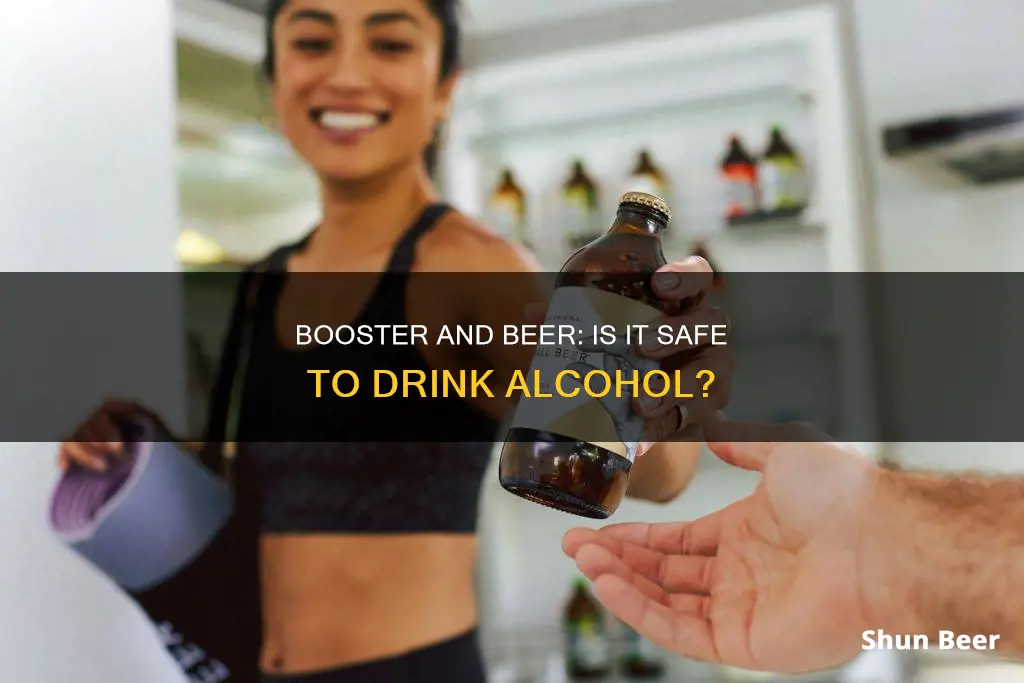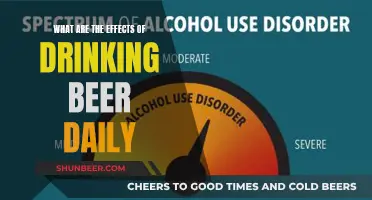
There is no official guidance on drinking alcohol after receiving a COVID-19 booster or vaccine. However, some experts advise against drinking alcohol, especially heavily, immediately after receiving the booster or vaccine. This is because alcohol may negatively impact your immune system, and side effects from drinking such as fatigue, headache, and nausea may mimic or worsen the side effects of the vaccine.
| Characteristics | Values |
|---|---|
| Drinking alcohol after a COVID-19 booster | No official guidelines exist, but some experts advise against drinking alcohol after receiving a COVID-19 booster, particularly heavy drinking or drinking in excess of moderate levels. |
| Drinking alcohol and immune response | Chronic, heavy alcohol use can impact your immune system response and lower your immunity. Research has shown that even a single episode of binge drinking can hinder your immune system. |
| Drinking alcohol and vaccine efficacy | There is no evidence that alcohol affects the efficacy of the COVID-19 booster. |
| Drinking alcohol and side effects | Alcohol may worsen the side effects of the COVID-19 booster, such as fatigue, headache, and nausea, which are similar to hangover symptoms. |
| Drinking alcohol and dehydration | Alcohol consumption can trigger dehydration, which may worsen the side effects of the COVID-19 booster. |
| Drinking alcohol and sleep | Heavy alcohol consumption may disturb sleep, and lack of sleep has been shown to weaken the immune system. |
What You'll Learn
- There are no official guidelines, but some advise against drinking alcohol after a booster
- Excessive alcohol consumption can lead to a weakened immune system
- Alcohol may worsen side effects of the booster, such as fatigue, headache, and nausea
- Alcohol consumption can also trigger dehydration, which may worsen side effects
- Experts recommend drinking in moderation if you choose to drink after a booster

There are no official guidelines, but some advise against drinking alcohol after a booster
While there are no official guidelines, some experts advise against drinking alcohol after receiving a COVID-19 booster or vaccine. There are a few reasons for this. Firstly, hangover symptoms such as fatigue, headache, and nausea may mimic or worsen the side effects of the vaccine. This may make it difficult to distinguish between the body's reaction to alcohol and the vaccine, and could put people off getting vaccinated.
Secondly, research has found that drinking alcohol every day may increase the risk of severe side effects from certain vaccines, such as the flu vaccine. While there is no evidence that alcohol affects the efficacy of the COVID-19 booster or vaccine, some experts still recommend abstaining or reducing alcohol intake for the first 48 to 72 hours after vaccination. This is the typical period when mild side effects such as fatigue, muscle aches, and injection site pain may occur.
Excessive alcohol consumption can also lead to a weakened immune system, making individuals more susceptible to infection and potentially reducing their response to a vaccine. However, moderate drinking, defined as one drink per day for women and two drinks per day for men, is generally considered acceptable and is not expected to negatively impact the immune response to the vaccine.
It is worth noting that combining alcohol with certain pain relievers, such as acetaminophen (Tylenol), can cause liver injury. Therefore, if you need to take pain relievers to manage any side effects of the COVID-19 booster or vaccine, it is recommended to avoid alcohol and opt for alternatives such as ibuprofen (Advil).
The Science Behind Fizzics Beer: How Does It Work?
You may want to see also

Excessive alcohol consumption can lead to a weakened immune system
While there are no official guidelines on drinking alcohol after receiving a COVID-19 booster or vaccine, some experts advise against drinking right after getting vaccinated. Research has found that drinking alcohol every day may increase the risk of severe side effects from the flu vaccine.
Heavy drinking can result in a 3-7 times higher vulnerability to serious conditions like pneumonia, developing from common respiratory tract infections. Alcohol can impact the number and variety of 'good' bacteria in the gastrointestinal (GI) tract, which is necessary for a healthy immune function. The cells that make up the lining of the GI tract regulate what is absorbed into our bodies, and alcohol impacts these cells, leading to the development of alcohol liver disease.
Research has also shown that even a single episode of binge drinking in otherwise healthy individuals can hinder the immune system. Binge drinking increases gut permeability, allowing toxins, bacteria, and other foreign substances to leak through the gut wall, fuelling a state of low-grade chronic inflammation.
Therefore, it is recommended to limit alcohol consumption to no more than 10 standard drinks per week and no more than 4 on any one occasion to lower the risk of alcohol impacting the immune system.
Beer and Medication: Is it Safe to Drink with GL?
You may want to see also

Alcohol may worsen side effects of the booster, such as fatigue, headache, and nausea
While there are no official guidelines, some experts advise against drinking alcohol right after getting the COVID-19 booster shot. This is because hangover symptoms such as fatigue, headache, and nausea may mimic or worsen the side effects of the vaccine. Research has found that drinking alcohol every day may increase the risk of severe side effects from the flu vaccine, so it may be best to avoid alcohol for a few days.
According to Dr. Mark Loafman, chair of family and community medicine for Cook County Health, there is no prohibition against drinking alcohol after receiving the COVID-19 booster shot. However, excessive alcohol consumption can lead to a weakened immune system. He defines excessive consumption as more than one drink per day for women and more than two drinks per day for men with consistent use over time.
Ilhem Messaoudi, director of the Center for Virus Research at the University of California, Irvine, echoes this sentiment, stating that moderate drinkers have no risk of drinking alcohol around the time of their vaccine. However, she warns that drinking large amounts of alcohol can have severe effects on the immune system.
To avoid dehydration and further worsening side effects, it is recommended to drink plenty of water after receiving the COVID-19 booster shot. Additionally, eating a balanced diet of whole foods, resting, and staying hydrated can help alleviate side effects such as fatigue, fever, and nausea.
Beer and Azo: What You Need to Know
You may want to see also

Alcohol consumption can also trigger dehydration, which may worsen side effects
While there are no official guidelines, some experts advise against drinking alcohol after receiving a COVID-19 booster or vaccine. This is because alcohol consumption can trigger dehydration, which may worsen side effects such as fatigue, headache, and nausea. These side effects may be mistaken for hangover symptoms.
Drinking alcohol can also affect how pain relievers work in the body. For example, combining acetaminophen (Tylenol) with alcohol can cause liver damage. On the other hand, ibuprofen (Advil) can be taken with alcohol without the same risk.
It is important to note that excessive alcohol consumption can lead to a weakened immune system, making individuals more susceptible to infection and potentially reducing their response to a vaccine. However, moderate alcohol consumption, defined as one drink per day for women and two drinks per day for men, is generally considered acceptable and is not expected to impact the effectiveness of the vaccine.
To summarize, while there is no definitive answer, it is recommended to avoid alcohol for a few days after receiving a COVID-19 booster or vaccine to minimize potential side effects and accurately assess the body's response to the vaccine.
Beer's Blood-Thinning Effect: Myth or Reality?
You may want to see also

Experts recommend drinking in moderation if you choose to drink after a booster
There is no official guidance on drinking alcohol after receiving a COVID-19 booster or vaccine. However, experts advise against heavy drinking immediately after receiving the booster or vaccine, as it may worsen the side effects such as fatigue, headache, and nausea.
According to Dr. Mark Loafman, chair of family and community medicine for Cook County Health, "excessive" alcohol consumption can lead to a weakened immune system, making individuals more susceptible to infection and potentially weakening their response to a vaccine. He defines "excessive" consumption as more than one drink per day for women and more than two drinks per day for men over an extended period.
Similarly, Ilhem Messaoudi, a professor of medicine and director of the Center for Virus Research at the University of California, Irvine, states that while moderate drinking poses no risk around the time of vaccination, drinking large amounts of alcohol can have severe effects on the immune system.
Therefore, if you choose to drink after receiving a COVID-19 booster or vaccine, experts recommend drinking in moderation. This means consuming no more than one drink per day for women and no more than two drinks per day for men. It is also important to be mindful of combining alcohol with certain medications, such as acetaminophen (Tylenol), as this can cause liver damage.
Additionally, it is worth noting that a balanced diet of nutrient-rich foods and staying hydrated can help boost your immune response to the COVID-19 vaccine and booster.
Beer Trading: How Does It Work?
You may want to see also







